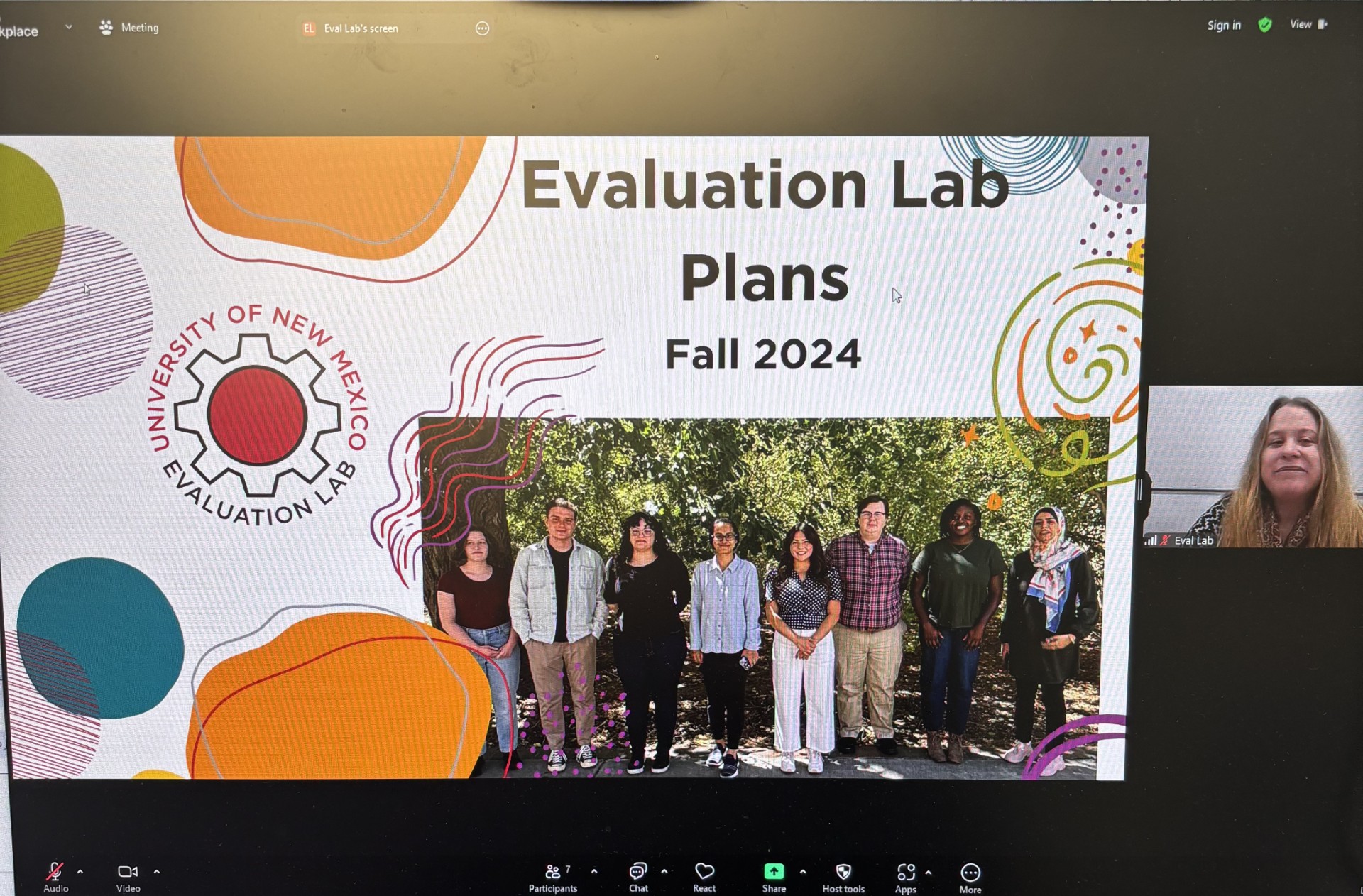Fellows present 2024-2025 Evaluation Plans
Evaluation Lab News
Posted: Dec 10, 2024 - 12:00am

On December 9th, the 2024-2025 Evaluation Lab Fellows presented their evaluation plans to their classmates, UNM staff and faculty, and the Lab's participating organizations. Each evaluation team consists of 2-3 graduate student fellows, a professional evaluator as a team lead, and 1-4 members of the partnering organization's staff. The student's have spent their first semester in the Lab learning different aspects of program evaluation and getting to know their organization and its evaluation needs. As a result, they have prepared evaluation questions and an evaluation plan, and will spend the next few months conducting evaluation activities and collecting data. The final evaluation outcomes and recommendations will be presented at the annual Evaluation Lab Expo on April 18th.
Animal Human Española
Española Humane is a rural animal-centered nonprofit that operates an animal shelter and a free spay/neuter clinic serving Española and Rio Arriba County. The focus of the evaluation is the spay/neuter clinic, which aims to reduce the unaltered pet population in the area. The evaluation team is responsible for drafting the evaluation plan and clinic logic model, with additional support from the clinic’s director and other staff. The evaluation seeks to assess the clinic’s impact on reducing the local unaltered pet population and to determine which communities are being reached. Key questions include the current number of unaltered animals, the expected timeline for a reduction in intake, and which areas are underserved. The evaluation also considers broader research on the effectiveness of free or low-cost spay/neuter programs in controlling pet populations, particularly in rural and culturally unique areas. It emphasizes the importance of education and outreach to increase awareness of the benefits of spaying and neutering. The evaluation process involves data review, feedback from stakeholders, and ongoing virtual meetings.
Office of Family Representation and Advocacy
The Office of Family Representation and Advocacy (OFRA), established in 2022 in New Mexico, provides legal and interdisciplinary support to parents and guardians involved with the child welfare system. Its mission is to respect family cultures, empower decision-making, and promote equitable outcomes through holistic advocacy, utilizing Interdisciplinary Legal Teams (ILT) consisting of lawyers, social workers, and family peer support navigators. OFRA follows the Cornerstone Advocacy model, focusing on family time, placement, services, and conferences to reduce foster care duration and enhance family stability. The organization prioritizes trauma-responsive care, diversity, inclusion, and client rights, ensuring culturally relevant services and informed consent. Research indicates that interdisciplinary approaches lead to faster reunification, shorter foster care stays, and improved family outcomes. The Evaluation Lab team and OFRA, aim to assess client experiences with interdisciplinary services versus traditional legal representation. The evaluation will involve in-depth interviews and surveys, with a focus on understanding how clients perceive their engagement with OFRA’s services, empowering them and improving their child welfare system experience.
Saranam
Saranam is a nonprofit organization focused on empowering families to end homelessness and poverty through housing, education, and community support. Using a two-generational approach, the program serves families with at least one adult and one child, offering housing, supplies, life skills classes, case management, and community connections. With the completion of its second campus in Albuquerque, Saranam will expand to serve more than double the current families. This year’s evaluation aims to assess the efficacy of Saranam’s model by examining how the program supports families in achieving long-term stability across key areas like housing, education, employment, and resilience. This year's evaluation team will use a participatory approach, incorporating qualitative data from focus groups with staff, current participants, and alumni. The findings will focus on the intake process, program support, curriculum, community development, and post-program success, with a follow-up cohort study in the next year to track outcomes over time.
Health Matters
The evaluation focuses on how healthcare and health insurance access impact the recruitment, retention, and graduation of students from diverse race/gender backgrounds in STEM programs. This issue is critical due to the persistent underrepresentation of marginalized groups in STEM, which exacerbates systemic inequalities and hinders innovation. The literature highlights the importance of an intersectionality framework to analyze how overlapping social identities—such as race, gender, socioeconomic status, and health—create unique barriers for students, particularly women of color in STEM. Research also identifies gaps in understanding the role of healthcare access in STEM retention, which this evaluation aims to address. Using both intersectional and qualitative methodologies, the study will explore how health-related challenges intersect with other social inequalities to impact students' educational trajectories. The evaluation aims to inform higher education policy and support strategies to improve student success in STEM fields by providing evidence-based insights grounded in an intersectionality framework.

